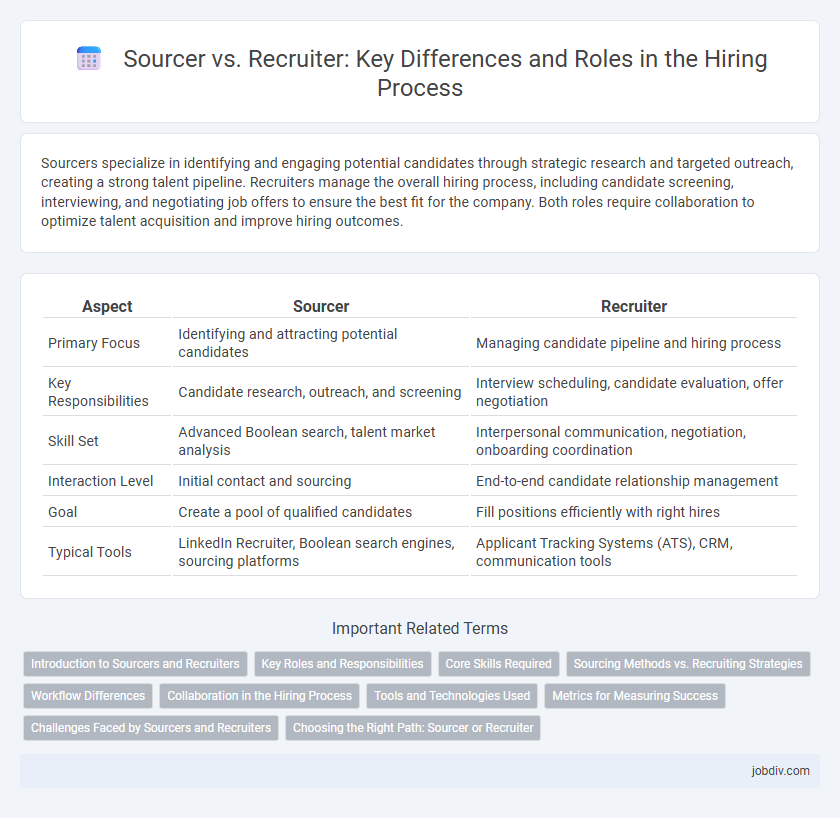Sourcers specialize in identifying and engaging potential candidates through strategic research and targeted outreach, creating a strong talent pipeline. Recruiters manage the overall hiring process, including candidate screening, interviewing, and negotiating job offers to ensure the best fit for the company. Both roles require collaboration to optimize talent acquisition and improve hiring outcomes.
Table of Comparison
| Aspect | Sourcer | Recruiter |
|---|---|---|
| Primary Focus | Identifying and attracting potential candidates | Managing candidate pipeline and hiring process |
| Key Responsibilities | Candidate research, outreach, and screening | Interview scheduling, candidate evaluation, offer negotiation |
| Skill Set | Advanced Boolean search, talent market analysis | Interpersonal communication, negotiation, onboarding coordination |
| Interaction Level | Initial contact and sourcing | End-to-end candidate relationship management |
| Goal | Create a pool of qualified candidates | Fill positions efficiently with right hires |
| Typical Tools | LinkedIn Recruiter, Boolean search engines, sourcing platforms | Applicant Tracking Systems (ATS), CRM, communication tools |
Introduction to Sourcers and Recruiters
Sourcers specialize in identifying and engaging passive candidates through advanced search techniques and data mining, supporting recruiters by building robust candidate pipelines. Recruiters manage end-to-end hiring processes, including candidate screening, interviewing, and negotiating job offers to ensure the best talent acquisition. Both roles are essential in talent acquisition strategies, with sourcers focusing on candidate discovery and recruiters on candidate management and placement.
Key Roles and Responsibilities
Sourcers specialize in identifying and engaging passive candidates through advanced search techniques, data mining, and market research to build talent pipelines. Recruiters manage the end-to-end hiring process, including screening, interviewing, and coordinating with hiring managers to close positions efficiently. Both roles collaborate to optimize talent acquisition strategies, but sourcers primarily focus on candidate discovery while recruiters handle candidate selection and onboarding.
Core Skills Required
Sourcers excel in advanced Boolean search techniques, data mining, and talent mapping to identify passive candidates efficiently. Recruiters require strong communication skills, candidate assessment abilities, and client relationship management to facilitate smooth hiring processes. Both roles demand proficiency in Applicant Tracking Systems (ATS) and labor market knowledge to ensure strategic talent acquisition.
Sourcing Methods vs. Recruiting Strategies
Sourcers employ advanced sourcing methods such as Boolean search, social media mining, and targeted database exploration to identify passive candidates efficiently. Recruiters implement comprehensive recruiting strategies that include candidate engagement, interview coordination, and full lifecycle management to convert sourced talent into hires. The effectiveness of hiring relies on the integration of precise sourcing techniques with strategic recruitment processes.
Workflow Differences
Sourcers specialize in the initial candidate identification and engagement, using advanced Boolean search techniques and talent mapping to build a pipeline of qualified prospects. Recruiters manage the end-to-end hiring process, including conducting interviews, coordinating with hiring managers, and extending job offers. Workflow differences center on sourcing's focus on candidate discovery and attraction, while recruiting emphasizes candidate evaluation and onboarding.
Collaboration in the Hiring Process
Sourcers and recruiters collaborate closely to streamline the hiring process by leveraging their specialized skills in candidate identification and engagement. Sourcers focus on deep market research and sourcing passive candidates, while recruiters manage candidate relationships and guide the interview process. This partnership enhances talent acquisition efficiency, reduces time-to-hire, and improves candidate quality across professional industries.
Tools and Technologies Used
Sourcers primarily leverage advanced Boolean search techniques, AI-powered sourcing platforms like LinkedIn Recruiter and Hiretual, and data mining tools to identify and engage passive candidates efficiently. Recruiters utilize applicant tracking systems (ATS) such as Greenhouse or Workday to manage candidate pipelines, streamline interview scheduling, and facilitate collaboration with hiring managers. Both roles increasingly adopt automation tools and analytics software to enhance candidate experience and optimize recruitment workflows.
Metrics for Measuring Success
Sourcers are primarily evaluated on metrics such as the number of qualified candidates sourced, response rates, and the time taken to identify potential talent pools. Recruiters are measured by metrics including time-to-fill, offer acceptance rates, and retention rates of placed candidates. Both roles utilize applicant tracking systems (ATS) data and candidate pipeline conversion rates to assess efficiency and success.
Challenges Faced by Sourcers and Recruiters
Sourcers encounter challenges such as identifying passive candidates and managing large data sets to uncover hidden talent pools, requiring advanced Boolean search techniques and market mapping skills. Recruiters face pressures in converting sourced candidates into hires while balancing client expectations, interview coordination, and timely communication throughout the hiring process. Both roles demand adaptability to evolving talent markets and robust relationship-building capabilities to overcome resource constraints and competition.
Choosing the Right Path: Sourcer or Recruiter
Choosing between a sourcer and a recruiter depends on your strengths and career goals within talent acquisition. Sourcers specialize in candidate research, leveraging Boolean searches and data analytics to create targeted talent pipelines, while recruiters manage the entire hiring process, from interviewing to negotiation and onboarding. Understanding these distinct roles helps professionals align their skills with the appropriate path, optimizing recruitment efficiency and candidate experience.
Sourcer vs Recruiter Infographic

 jobdiv.com
jobdiv.com